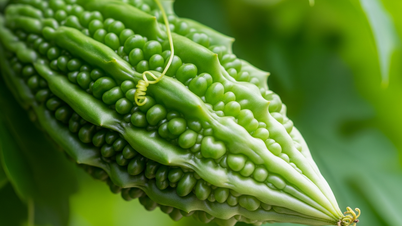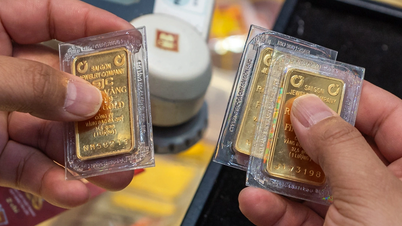Nutritional composition of bitter melon
The Health & Life newspaper quoted Webmd as saying that the amount and type of nutrients you can get from bitter melon will depend on whether you eat it raw or cooked. There are at least 32 active chemicals in this fruit.
You can get the following nutrients from eating 1 cup (130 grams) of cooked bitter melon:
- Calories: 53.3 kcal
- Protein: 1.07g
- Total fat: 3.52g
- Carbohydrate: 5.45g
- Sugar: 2.46g
- Fiber: 2.47g
Bitter melon also contains the following vitamins, minerals and antioxidants:
- Vitamins: Bitter melon is an excellent source of vitamin C (contains about 41.5g of this vitamin in 1 cup), a large amount of folate (natural form of vitamin B9) which cells need to grow.
- Minerals: Bitter melon has twice the calcium of spinach and twice the potassium of bananas.
- Antioxidants: Bitter melon contains high levels of antioxidants, which help protect cells from inflammation and oxidative damage. Among them, the most powerful are gallic acid, chlorogenic acid, catechin, and epicatechin.

Bitter melon is good for health but not suitable for some people
Vitamin C in bitter melon acts as an antioxidant, helping the body absorb iron. Vitamin C is needed to support healthy skin, bones, and connective tissue; aids in collagen production, wound healing, protein metabolism, and is good for immune function.
People who should not eat bitter melon
The article on the Medlatec General Hospital website has medical consultation with BSCKI. Duong Ngoc Van said that although bitter melon has many good effects on health, there are some groups of people who should not use this food. These are the following groups of people:
- Pregnant women, especially in early pregnancy and breastfeeding women
- Children
- Patients with low blood pressure
- People with digestive problems
- Patients before and after surgery (stop eating at least 2 weeks before and after surgery)
- People with calcium deficiency
- People with G6PD deficiency
Things to note when using bitter melon
Using too much bitter melon can cause bloating, indigestion, belching, and diarrhea. In addition, overusing this food has the potential to lead to a sudden drop in blood sugar, causing headaches, dizziness, sweating, and possibly fainting.
To ensure effectiveness and avoid unwanted side effects, you can keep in mind a few notes when using bitter melon as follows:
- Consume in moderation, do not abuse.
- Do not combine bitter melon with shrimp or eat it at the same time with fried pork ribs or mangosteen.
- Avoid drinking green tea after eating bitter melon as it can upset your stomach. Instead, wait a few hours after eating before drinking.
- Bitter melon should not be eaten on an empty stomach.
Through the above article, readers have learned some more information related to bitter melon in terms of nutritional composition as well as some things to know when using this food. Thereby, it can help you know how to effectively use bitter melon in your diet to take advantage of the wonderful benefits it brings.
Source: https://vtcnews.vn/nguoi-nao-khong-nen-an-muop-dang-ar907222.html



![[Photo] President Luong Cuong receives President of the Cuban National Assembly Esteban Lazo Hernandez](https://vphoto.vietnam.vn/thumb/1200x675/vietnam/resource/IMAGE/2025/9/30/4d38932911c24f6ea1936252bd5427fa)
![[Photo] Panorama of the cable-stayed bridge, the final bottleneck of the Ben Luc-Long Thanh expressway](https://vphoto.vietnam.vn/thumb/1200x675/vietnam/resource/IMAGE/2025/9/30/391fdf21025541d6b2f092e49a17243f)


![[Photo] The 1st Congress of Phu Tho Provincial Party Committee, term 2025-2030](https://vphoto.vietnam.vn/thumb/1200x675/vietnam/resource/IMAGE/2025/9/30/1507da06216649bba8a1ce6251816820)






























![[Photo] Solemn opening of the 12th Military Party Congress for the 2025-2030 term](https://vphoto.vietnam.vn/thumb/1200x675/vietnam/resource/IMAGE/2025/9/30/2cd383b3130d41a1a4b5ace0d5eb989d)






























































Comment (0)